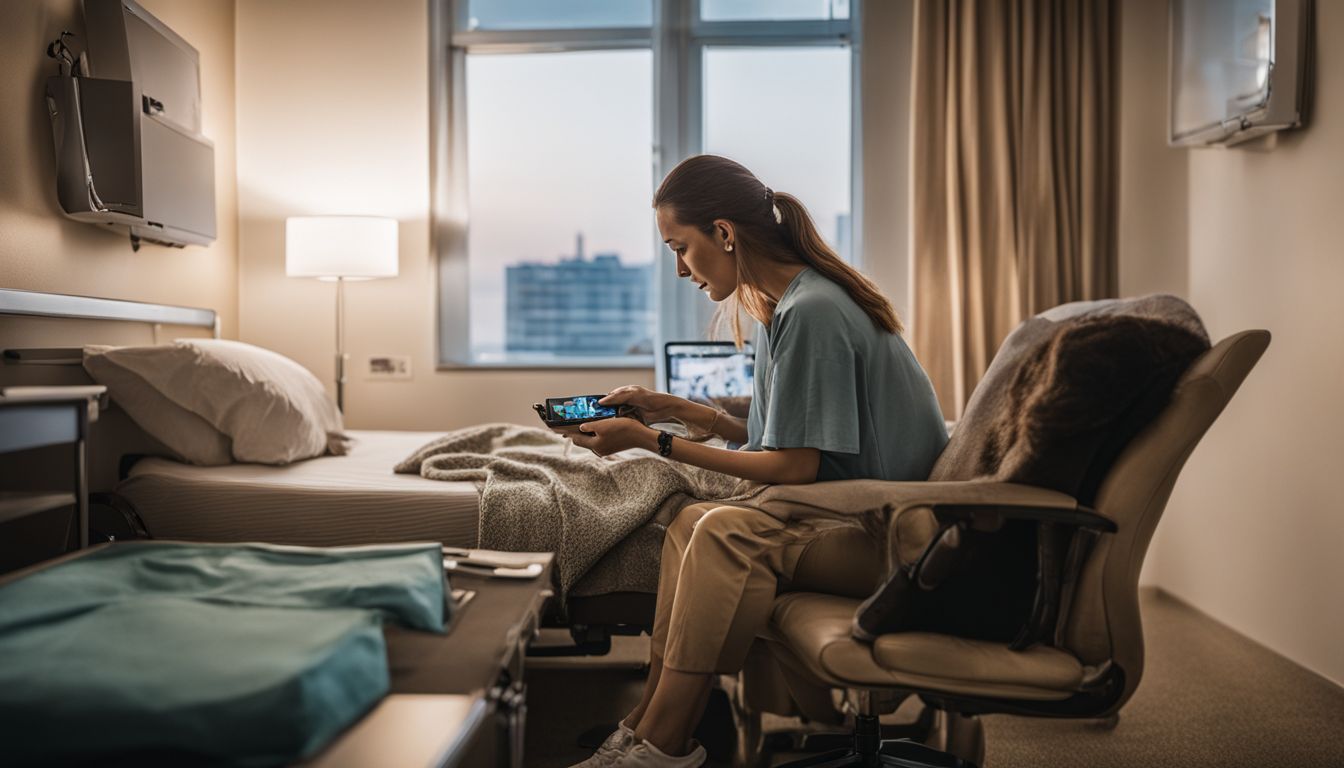Caring for an aging parent can feel overwhelming, especially when they struggle with daily tasks. Many older adults face challenges like dressing, cooking, or managing medications due to health issues. 1 This guide breaks down the most common struggles and offers practical tips to ease their day-to-day life. 3 Keep reading to learn how you can make a difference! 2
- Aging parents often struggle with Activities of Daily Living (ADLs), like dressing, bathing, and using the toilet. Arthritis or mobility issues can make these tasks painful. Simple tools like grab bars or slip-on shoes help improve safety.
- Instrumental Activities of Daily Living (IADLs), such as cooking, grocery shopping, and managing bills, are harder due to fatigue, memory loss, or poor eyesight. Services like online grocery delivery or home care assistance offer support.
- Mobility challenges increase fall risks at home. Adding grab bars near beds and toilets, decluttering pathways, or using walkers can make movement easier and safer for seniors.
- Managing medications is a common issue for older adults. Using pill organizers with alarms and scheduling regular doctor visits helps avoid missed doses or harmful mistakes.
- Nutrition becomes a challenge due to appetite loss or dental problems. Pre-chopped ingredients, meal delivery services like Meals-on-Wheels, and adaptive utensils aid in healthy eating routines.
Identifying the Most Challenging Daily Living Tasks for Aging Parents
As people age, their ability to perform daily living tasks often becomes challenged. Approximately two-thirds of older adults have two or more chronic conditions, with common conditions including arthritis, heart disease, cancer, diabetes, and hypertension, which can significantly impact their ability to perform daily activities (Ewen et al., 2017) (Salive, 2013).
Activities of Daily Living are divided into two main categories (He et al., 2017) (Bell et al., 2016). Basic Activities of Daily Living (BADLs) encompass fundamental self-care tasks such as bathing, dressing, toileting, maintaining personal hygiene, eating, and functional mobility (Thakur et al., 2020). Instrumental Activities of Daily Living (IADLs) involve more complex tasks necessary for independent community living, including cooking, driving, using telephones or computers, shopping, managing finances, and handling medications (Fattah et al., 2017).
These ADL assessments serve as important diagnostic tools, particularly for tracking cognitive disorders like dementia (Lee et al., 2024) (Bucks et al., 1996). The development of standardized ADL measurement tools, notably the Katz index and Lawton-Brody scale, has provided healthcare professionals with reliable means to evaluate an older person’s functional status and independence level (Fattah et al., 2017) (Katz, 1983) (Lawton et al., 1969).
Fatigue slows them down as well. Activities of Daily Living (ADLs), such as bathing or using the toilet, might require assistance as time goes on. 1
Instrumental Activities of Daily Living (IADLs) pose greater difficulties for many seniors. Grocery shopping, laundry, and managing bills require energy and focus. Poor eyesight or memory adds to the hardship.
Mobility issues may also occur due to conditions like congestive heart failure or lung disease. 1
Small things we take for granted can feel like climbing a mountain for our aging loved ones.
Personal Care Challenges for Elderly Parents
Some aging parents struggle with basic self-care. Tasks that once took minutes can now feel like climbing a mountain.
Dressing and Grooming
Getting dressed and staying well-groomed can be tough for aging parents. Small tasks like putting on a shirt or combing hair may feel impossible.
- Buttons, zippers, and shoelaces can be tricky with limited dexterity. Pullover sweaters and slip-on shoes help make things easier.
- Arthritis makes holding grooming tools painful. Large-handled combs or brushes reduce strain on stiff hands.
- Managing haircuts might stop being an option for them. Monthly hairstylist visits at home are a helpful alternative and often referred by hospitals or nursing homes.
- Shaving safely becomes a concern as grip strength weakens. Electric razors work better for safer and quicker shaves.
- Dental hygiene slips without the proper tools. Specialized toothbrushes, like those with thicker handles, work wonders for easy brushing.
- Oral health support is key as seniors age. Mobile dentistry allows tooth care without trips to offices.
Next up, let’s look at mobility challenges your parent may face.
Bathing and Maintaining Hygiene
Keeping clean gets harder as parents age. Bathing helps avoid infections and boosts confidence.
- Install grab bars by the bathtub and toilet. They help with balance and prevent falls. 4
- Use a bath chair to make washing safer and less tiring for your parent.
- Recommend full showers or tub baths only once a week to protect their skin’s health.
- Offer no-rinse shampoos for quick, easy hair care without water spills. 5
- Avoid bubble baths or baby oil in the tub, as these can cause slipping accidents.
- Place motion-sensitive lights in bathrooms for better night-time visibility and safety.
Using the Toilet Independently
Some aging parents find using the toilet independently a major challenge. Mobility issues and bathroom design can make this task harder.
- Transferring on and off the toilet is tough for 53% of older adults with mobility problems. Falls or dizziness add to the risk during these movements.
- Raised toilet seat adapters give height and reduce strain on joints. Portable commodes can also help if getting to the bathroom is too difficult.
- Install grab bars near the toilet for extra support while sitting or standing. These bars create stability, especially for those with weak legs or poor balance.
- Elevated toilets are an option that makes standing easier after use. They are useful for individuals recovering from surgeries, like hip replacements.
- Encourage seniors to sit and dangle their legs before standing up after toileting. This tip reduces dizziness caused by quick movement changes.
- Only 10% of families take steps to modify bathrooms for safety, like adding non-slip mats or better lighting. Small updates make a big difference in preventing accidents.
- Occupational therapists can evaluate bathroom setups and suggest appropriate aids or modifications suited to individual needs.
- Caregivers may assist with hygiene tasks but should be mindful of preserving privacy and dignity as much as possible.
- Tools like wet wipes, easy-to-reach flush handles, and accessible personal care items simplify post-use cleanup for many elderly individuals.
- Long-term solutions, such as home modifications suggested by health care providers, improve safety while maintaining independence over time.
Aging Parents: Mobility and Movement Difficulties
Getting out of a cozy chair or bed can feel like climbing a mountain for aging parents, so finding simple ways to help them move more easily is key.
Getting in and out of Bed or Chairs
Many older adults face difficulties getting up from beds or chairs. These tasks might look simple but can become hard with age-related challenges.
- Arthritis can make muscles stiff and weak, making it hard for your parent to move easily between positions. Pain in joints worsens the effort required to stand or lie down. 3
- Cognitive problems like Alzheimer’s disease add confusion during transitions. Your parent may forget how to shift safely, which increases the risk of falling.
- Weak legs or balance issues often mean they struggle with steady movements. Half of seniors over 85 experience mobility limitations that make sitting and standing tough.
- Assistive devices like bed rails or lift chairs add support during movement. Many seniors use these tools to regain independence and reduce strain.
- Adding grab bars next to beds or favorite chairs helps older adults feel secure while moving. These simple changes prevent falls, especially during nighttime trips.
- Poor motor skills caused by aging impact muscle control, leading to jerky or slow motions when rising up or settling down.
- A physical therapist can teach exercises that strengthen core muscles needed for transitions. Even small improvements in strength create big differences in ease of movement.
- Skipping doctor check-ups leaves underlying health issues untreated, which silently worsens mobility struggles over time without proper care plans from health care workers.
- Caregivers play a vital role when accidents happen due to failed attempts at transfers alone. Their presence prevents broken bones common among falls related to unstable movements found in elder care scenarios.
Walking and Navigating the Home
Walking safely at home becomes harder with age. Falls are a serious risk and can lead to injuries or worse. 6
1. Remove loose rugs and clutter from the floor. These can trip aging parents, leading to falls.
2. Install grab bars or handrails in hallways or near stairs. They provide added balance and support during movement.
3. Encourage regular vision tests to check for issues that might affect depth or clarity. Poor eyesight increases fall risks.
4. Use mobility aids like walkers or canes if recommended by a physical therapist or doctor. They help maintain stability while walking around the house.
5. Add brighter lights in dim areas like stairwells and bathrooms. Poor lighting makes obstacles harder to see, raising the chance of tripping.
6. Ensure floors stay dry, especially in kitchens and bathrooms, where spills happen often.
7. Arrange furniture to create wide, clear paths for easy movement throughout rooms.
8. Provide sturdy footwear with non-slip soles instead of thin slippers that slide on smooth surfaces.
9. Suggest simple exercises or physical therapy sessions to improve strength and balance over time. 7
10. Talk to an occupational therapist for advice on how to make home adjustments safer for daily living tasks.
Nutrition and Eating Struggles for Your Elderly Parent
Cooking feels like climbing a mountain for some seniors, especially if knives or pots seem too heavy; read on to learn how small changes can make mealtime easier.
Preparing Meals
Many aging parents find meal preparation challenging. Physical limitations, memory loss, or low energy can make cooking feel like a mountain to climb.
- Cutting ingredients can be hard for seniors with arthritis or weak hands. Using pre-chopped veggies or adaptive utensils can help ease this task.
- Standing at the stove may tire out older adults quickly. Providing stools or investing in slow cookers or microwaves simplifies the process.
- Loss of appetite might lead to poor nutrition. Freezing meals ahead with bold labels ensures they eat healthy portions regularly.
- Forgetfulness often affects meal schedules for Alzheimer’s patients. Setting reminders or using automatic timers on appliances prevents skipped meals or accidents. 8
- Grocery stores might seem overwhelming for some parents. Online shopping options or local delivery services like Meals-on-Wheels can save time and effort.
- Kitchen safety becomes a concern as risks increase with age. Removing sharp tools, securing loose rugs, and labeling food items clearly can prevent accidents and confusion.
- Cooking fatigue may stop them from eating entirely some days. Stocking frozen meals makes heating quick, so they don’t have to wrestle with pots and pans daily!
Eating and Managing Nutrition
Eating well becomes harder for many older adults as they age. Your parent might face struggles with appetite, food preparation, or even physical ability.
- Appetite often decreases with age, making meals less appealing. Diminished taste buds or a weaker sense of smell can make food bland and uninteresting.
- Weight loss may occur due to malnutrition. Frail seniors should aim for 30 kcal per kilogram of body weight and at least 1 gram of protein per day per kilogram to stay healthy. 9
- Social isolation can worsen eating habits. Eating alone often causes people to skip meals or snack on unhealthy options instead.
- Poor dental health adds challenges to eating properly. Pain from cavities, missing teeth, or sore gums might limit the foods your parent feels comfortable chewing.
- Meal assistance is sometimes needed due to mobility issues or hand tremors. Cutting food into smaller pieces or using adaptive utensils can help reduce frustration.
- Grocery shopping becomes tougher with aging parents who have limited transportation options or live far from supermarkets. Lack of fresh ingredients leads to imbalanced diets.
- Preparing balanced meals is difficult if memory loss affects planning skills, especially in parents with Alzheimer’s disease or related conditions. 10
- Medical conditions can require special diets that seem overwhelming without caregiver support or guidance from an occupational therapist.
- Hydration needs are often ignored by older adults, increasing their risk of dehydration-related problems like fatigue and confusion.
- Screening tools such as MUST (Malnutrition Universal Screening Tool) help identify risks early before serious health issues develop over time.
Household Management Tasks
Keeping up with the house can feel like running a marathon for an aging parent, so let’s explore ways to ease the load.
Cleaning and Laundry
Some tasks, like cleaning and laundry, can become harder for aging parents. Stamina loss and reduced dexterity are common reasons for this struggle.
- Older adults often get tired faster while doing household chores. It can take them much longer to finish simple cleaning tasks, like dusting or mopping floors.
- Laundry becomes a problem when lifting heavy baskets or reaching into washers and dryers hurts their joints. Arthritis or back pain might make the task unbearable.
- Stains on clothes or spills in the house may go unnoticed due to declining vision. This adds more challenges and increases frustration.
- Organizing cleaning supplies can feel overwhelming for parents with memory problems, such as Alzheimer’s disease. They struggle to keep track of what they need or where things are stored.
- Asking for help with these tasks can feel embarrassing but is often necessary to avoid accidents such as falls while carrying laundry up stairs.
- Simple fixes like lightweight laundry hampers or long-handled tools can reduce strain during these activities. Home modifications also play an important role in making cleaning easier for seniors.
Caring children might consider hiring professional cleaners or enrolling parents in assisted living communities to handle these duties effectively.
Shopping for Groceries and Essentials
Daily household tasks can wear out aging parents. Grocery shopping is one of those chores that can feel overwhelming for them.
- Seniors often struggle with physical demands, like lifting heavy bags or standing in long lines. Chronic conditions such as arthritis or heart disease make it even harder. 11
- Medications impact energy levels and mobility, which complicates shopping trips. Fatigue or dizziness is common after treatments, making outings risky.
- Mental hurdles also play a role, especially with Alzheimer’s disease or memory loss. Finding items or managing a list becomes confusing in crowded stores. 12
- Home care services help seniors shop safely and comfortably. A caregiver can carry bags, push carts, and support them throughout the store.
- Many families now use online grocery services like Instacart or Amazon Fresh to simplify this chore. This avoids the hassle of leaving home altogether. 12
- Shopping during senior discount hours reduces stress from busy crowds while saving money for fixed incomes.
- Local programs through places like Area Agencies on Aging may offer volunteers to assist with errands. It’s a great option for caregivers who live far away.
- Encouraging small adjustments at home can help mothers and fathers maintain independence longer—like keeping essentials within arm’s reach to avoid heavy hauling later.
Medication and Health Maintenance
Keeping track of pills and doctors can feel like juggling flaming torches, but it’s a key part of staying healthy—read on to find out how to make it easier.
Managing Medication Schedules
Managing medications is a significant challenge for many aging parents. They can easily forget doses or mix up pills, which may result in serious harm. 13
- Prepare a clear schedule with times and doses listed. Use large fonts for easy reading. Place it somewhere visible, like near the refrigerator or bedside table.
- Use pill organizers to sort medication by days of the week. Some even include alarms to remind them to take their pills on time.
- Synchronize all prescriptions at one pharmacy, so refills occur together. This avoids making multiple trips and reduces confusion.
- Consider individual dose packaging from a pharmacist. These separate pills into sealed packs labeled by date and time for safe use.
- Consult an occupational therapist or social worker about tools that make handling small pills easier.
- Schedule regular discussions with their doctor or psychiatric nurse if any medication side effects arise. Even vitamins or supplements should get approved first.
- Set reminders on phones or smartwatches if additional help is needed for remembering medications during the day.
- Involve home caregivers or nurses to oversee medications if you live far away or cannot visit frequently. Long-distance caregiving becomes more manageable this way too.
- Stay alert for signs of missed medications like confusion, mood swings, or repeated falls — these accidents are common in seniors on multiple medications daily. 14
- For Alzheimer’s disease patients, consult geriatric medicine professionals regularly since their needs often shift quickly due to health declines over time.
Attending Doctor’s Appointments and Following Medical Advice
Keeping track of doctor’s visits can be stressful for aging parents. Managing health issues and medications adds to the challenge.
- Many seniors have multiple doctors prescribing different medications. This causes confusion about schedules, doses, and potential side effects. 15
- Missing an appointment may worsen chronic conditions like diabetes or Alzheimer’s disease. Regular check-ups help control these illnesses early.
- Transportation is a common barrier for older adults. They may no longer drive or feel unsafe using public transportation, leaving caregivers to step in.
- Discussing medical advice with a parent can be tricky. Resistance to help could stem from fear or denial about their health changes.
- Seniors living alone are at higher risk of neglecting important care routines, including follow-up appointments after hospitalization or surgeries.
- A caregiver or caseworker can assist by scheduling visits and organizing medication plans on calendars or apps designed for tracking daily activities.
Let’s explore how mobility challenges also affect their independence and safety at home next!
Caring for an aging parent is no small task. Challenges like dressing, cooking, or managing medications can weigh heavy on both of you. Help isn’t far away—talk to a social worker, physical therapist, or local agencies for guidance.
The impact of providing care for aging parents with daily living challenges is substantial and multifaceted. Caregivers are expected to manage a wide range of tasks, from instrumental care like shopping and transportation to personal care tasks such as bathing, dressing, and feeding (Amar et al., 2022). Many caregivers must also take on healthcare-related responsibilities, including medication management and medical procedures, despite often lacking formal training (Amar et al., 2022).
Small changes, like grab bars or meal delivery services, can make a big difference. Stay patient and involve your loved one in every step.
Related Questions
1. What are activities of daily living (ADLs), and why are they important for aging parents?
Activities of daily living (ADLs) include basic tasks like dressing, bathing, eating, and using the bathroom. These skills help maintain independence and quality of life for your aging parent.
2. How can caregivers support instrumental activities of daily living (IADLs)?
Caregivers can assist with IADLs such as managing finances, grocery shopping, cooking meals, or arranging transportation. These tasks often become challenging as parents age.
3. When should you consider assisted living communities or long-term care for an aging parent?
If your parent struggles with ADLs or has conditions like Alzheimer’s disease that require extra supervision, it might be time to explore assisted living communities or skilled nursing facilities.
4. Can home modifications make a difference in helping seniors stay independent?
Yes! Simple changes like grab bars in bathrooms or better lighting reduce risks and improve safety at home for seniors facing mobility challenges.
5. How do professionals like occupational therapists or social workers help with senior care?
Occupational therapists focus on improving daily living skills while social workers connect families to resources like respite care services or an area agency on aging.
6. What role does mental health play in caregiving for elderly parents?
Mental health is crucial—for both the caregiver and the parent! Social engagement through hairstylists, physical therapists, or even caseworkers helps prevent isolation while keeping spirits higher during tough times.
Resources
- ^ https://pmc.ncbi.nlm.nih.gov/articles/PMC9670020/
- ^ https://www.nia.nih.gov/health/alzheimers-caregiving/alzheimers-caregiving-bathing-dressing-and-grooming (2024-07-18)
- ^ https://www.healthinaging.org/tools-and-tips/caregiver-guide-problems-daily-living
- ^ https://www.aplaceformom.com/caregiver-resources/articles/grooming-and-hygiene
- ^ https://cappellagrandjunction.com/blog/helping-an-aging-parent-who-doesnt-want-to-bathe/ (2024-03-22)
- ^ https://www.healthinaging.org/tools-and-tips/caregiver-guide-mobility-problems
- ^ https://pmc.ncbi.nlm.nih.gov/articles/PMC10360303/
- ^ https://gantons.com/what-to-do-when-aging-parents-struggle-with-meals/ (2023-09-22)
- ^ https://pmc.ncbi.nlm.nih.gov/articles/PMC6521101/
- ^ https://www.alz.org/help-support/caregiving/daily-care/food-eating
- ^ https://buttershomecare.com/5-essential-tasks-seniors-aging-in-place-struggle-with/ (2024-10-21)
- ^ https://www.griswoldcare.com/blog/grocery-shopping-for-elderly-adults-a-senior-shopping-service-you-may-need/
- ^ https://www.mayoclinichealthsystem.org/hometown-health/featured-topic/5-tips-for-managing-medications-for-aging-parents-during-a-pandemic (2023-07-19)
- ^ https://pmc.ncbi.nlm.nih.gov/articles/PMC6441224/
- ^ https://www.health.harvard.edu/blog/taking-an-aging-parent-to-the-doctor-10-helpful-tips-202202282696 (2024-09-27)

















